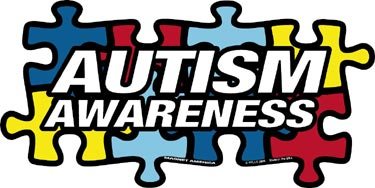In honor of Autism Awareness Month, we are going to start out with the basics for those of us who do not know much about Autism other than it starts in young children and affects the brain’s normal development of social and communication skills. Although no one knows what causes Autism, every year, more and more children are being diagnosed with Autism.
What you need to know—FAQ Style
What is Autism?
Autism is included in a group of disorders known as autism spectrum disorders. (ASD) It appears in the first 3 years of life and is characterized by different degrees of impairment in social abilities, communication skills and repetitive behaviors. The symptoms can range from mild to severe—one of the common milder forms is Asperger’s Syndrome. (This hyperlink is a clip from South Park where Cartman tries to make it look like he has “Ass Burgers” so proceeds to put burgers in his pants before going to see the school nurse. Hilarious.)
What are the early signs of Autism?
Parents, if you notice any of these signs in your young children, it may be a good idea to consult your pediatrician:
• Little or no eye contact
• Delay or lack of development in verbal communication—doesn’t make noises to get your attention
• Repetitive mannerisms or use of language
• Little spontaneity, no “make-believe” play
• Fixation on parts of objects
• Solitary—lack of interest in peer relationships
• Doesn’t follow gestures when you are pointing things out
• Lack of recognition when smiled at
• Little interest in imitating your facial expressions and movements
How common is Autism?
The Centers for Disease Control estimated that about 1 in 88 children in the U.S. have an Autism Spectrum Disorder. (ASD) This has shown an increase in the recent decades. So, there are about 1.5 million Americans may be affected with Autism as of this year and it is the most prevalent developmental disorder to date.
Is Autism curable?
When researching, I found different answers to this question. To begin, there is no specific cure for autism. Each child is unique, has different symptoms and will respond differently to various “treatments”. Therefore, it is beneficial to develop comprehensive treatment plans to focus on each child individually. Also, the sooner you realize your child has autism and start doing something about it, the better. On the other hand, I found a source that claims a biomedical treatment can help about 20-30% of autistics under the age of 2 ½ who try this method. Obviously, I’m not saying this will work, but it is something to look into if you or someone you know believes their young child may have autism.
Will my child be able to attend school?
In most cases, yes, but it depends on how mild or severe your child’s case is. With the support from you, doctors, teachers and therapists, your child should be able to attend school. “According to the Individuals with Disabilities Act of 1990, which mentions autistic children specifically, your child deserves access to a “free and appropriate” education funded by the government, whether it be in a mainstream or special education classroom.” If your child needs to be in a special education room, that would be the best for your child as well as other children. Reasons for this are that autistics kids may have coexisting learning and intellectual disabilities, aggressive behaviors, speech delays, or need individual supervision.
Obviously there is much more to this disorder and I have just scratched the surface, but it is very important for parents to take note of their child’s behaviors and take action if you are concerned in the least bit. Trust your instincts, no one knows your child like you do and your doctor will take that into consideration. Don’t simply wait and see—that is the worst thing you can do. This is a very unfortunate disorder as are many, but it is nothing you can’t work through and become accustomed to. I know you never want to think this could happen to your child, but catching autism early makes a tremendous difference. Learn about autism, learn about your child and help them to grow and thrive.
Who can give us more insight to this disorder? What has worked best in improving conditions in someone you know who has Autism?




Comments (0)